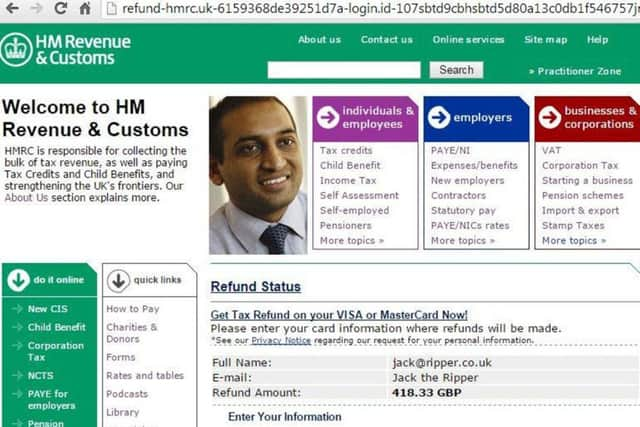Six scams to watch out for in 2016


Here are some of the ones to watch out for this year. RANSOMWARE
Ransomware holds your computer hostage. By clicking on a link in an email or on social media, it downloads a file into your machine, allowing a third party to lock your computer, or hand held device.
Advertisement
Hide AdAdvertisement
Hide AdThe third party then demands payment to unlock your device, typically through online money services such as Bitcoin or MoneyPak as they are harder to trace.


Some even take it further and inform the user they are from special investigative services such as MI6 or the FBI and tell users they have been caught looking at child abuse images and need to pay them to have they system unlocked.
Victims include Ellen Conlin Hair & Beauty which has salons in Hyndland in Glasgow’s West End and Giffnock, who were forced to pay cyberhackers £1000 after they successfully locked them out of their work computer and began deleting database files.
Because of the type of attack there is little users can do but pay to have their system unlocked as there is currently no over ride for this.
FAKE PAYPAL EMAIL


Fraudlent emails from companies like PayPal, eBay and even the tax office inform users that their account has been experiencing suspicious activity and to log in to review it.
Once the user has logged in, the hackers have access to account details.
A woman in Rutherglen, South Lanarkshire was recently victim to an email scam. Lynne Reeves thought she had found a new job as a customer care assistant but was told she needed to pay £100 to go through a disclosure, as she would be working with people’s credit details.
After turning up to her first day at work, Ms Reeves was devastated to find the company didn’t even exist and that she had just been robbed of £100 the week before Christmas.
DODGY BUYING AND SELLING
Advertisement
Hide AdAdvertisement
Hide Adthe rise of online shopping has created an increased risk when buying or selling using second hand site such as eBay, Gumtree or Craigslist.
This also comes with certain risks. Gumtree takes no responsibility for items sold - so if your television doesn’t work or the blender never arrives, you can’t get your money back.
While eBay does offer buyer protection, it doesn’t on the eBay vehicle site, leading to many shoppers paying for a car which never arrives.
One particular scam involves people who sell furniture to someone a distance away and pay for a delivery fee warns user on Gumtree’s messageboard. The customer is then asked to transfer the delivery fee to a third party removal firm, who now have access to the sellers bank details.
Hours later, the seller finds that money has disappeared from their account.
PENSION THEFT
When the government introduced a new scheme to allow people to cash in their pensions over the age of 55, a myriad of companies formed at the back of it.
They would offer to check up how much you were owed and help to expedite the process, for a small fee. The also can tell you that they can give you the best advice on how to avoid tax on your pension, or get a higher sum for lower tax.
People would then give over their account details and these fake companies would then be free to raid someone’s pension plan.
DEBT COLLECTORS
Advertisement
Hide AdAdvertisement
Hide AdConsumer protection website, Which? expects there to be a rise in the number of people posing as fake debt collectors.
With the rise in credit now available to consumers, comes the rising levels of debt. Some scammers will be looking to take advantage of that, turning up at doors and demanding payment for a debt that either the person paid off, or didn’t even exist in the first place.
They use intimidation tactics, including implications that they can enter their property and seize goods as payment - none of which is legal in the UK.
A real debt collector is also not allowed to discuss the financial situation with anyone bar the named person, under the Data Protection Act (1998). If someone approaches a family member or flat mate about your debt, they are most likely fake.
FAKE CHARITIES
Pulling on the heart strings, these charities will tell you about the children, or animals who need your help, through a one-off or monthly donation, pressuring you either over the phone or in person to donate there and then, before you have time to check up on them.
If you think it may be a fake charity, ask for the charity number or contact details for the fund-raising team. A real charity will be able to provide them so you can confirm the charity is real. A fake charity will be less forthcoming about these sorts of details.
